Wednesday, 20 March 2024 TEN FULL PROFESSORS INAUGURATED AT UP
On Tuesday, 19 March 2024, a solemn inauguration of full professors of the University of Primorska took place in the hall of the Armeria Palace in Koper. Vice-rector prof. dr. Štefko Miklavič, with Deans of UP FAMNIT, UP FVZ and UP PEF, handed over the decisions on the election to the title of ten new full professors of the University of Primorska.
Among the inaugurated professors are also colleagues of UP IAM and UP Famnit.
DR. DUNJA BANDELJ, FULL PROFESSOR IN THE FIELD OF »PLANT PRODUCTION AND PROCESSING« AND RESEARCH COUNSELLOR
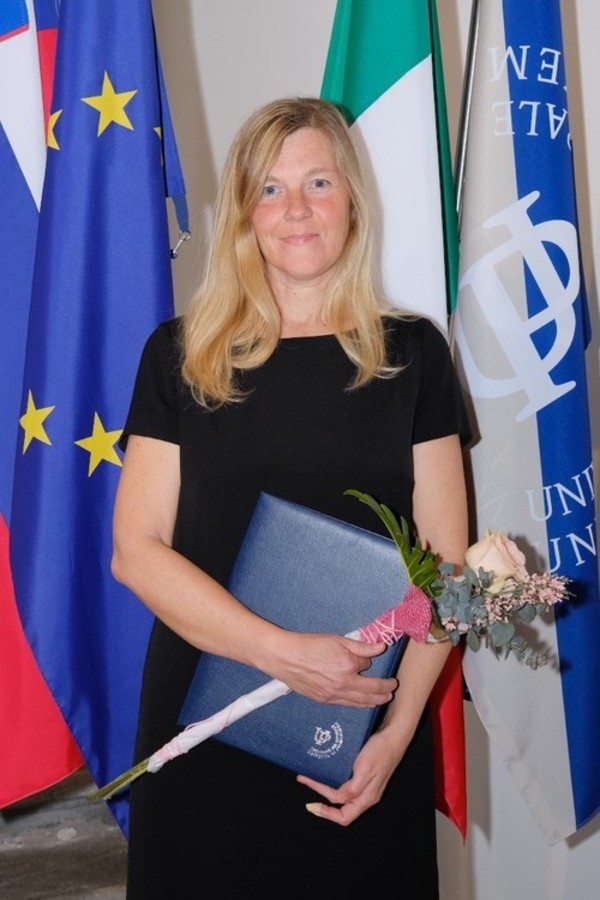 Dr. Dunja Bandelj graduated in the field of agronomy from the Biotechnical Faculty at the University of Ljubljana in 1998. As a young researcher, she continued her doctoral training in the field of agronomic sciences at the Biotechnical Faculty, where she focused on research in the molecular genetics of olives. In 2008, she was employed as an assistant professor at the Faculty of Mathematics, Natural Sciences, and Information Technologies and became head of the Department of Applied Natural Sciences. Since then, she has been employed at UP FAMNIT and actively involved in the management of the faculty, as the head of the Department of Applied Natural Sciences, coordinator of the Agronomy study program, a member of the faculty and university Senate. In 2016, she became vice-dean for student affairs.
Dr. Dunja Bandelj graduated in the field of agronomy from the Biotechnical Faculty at the University of Ljubljana in 1998. As a young researcher, she continued her doctoral training in the field of agronomic sciences at the Biotechnical Faculty, where she focused on research in the molecular genetics of olives. In 2008, she was employed as an assistant professor at the Faculty of Mathematics, Natural Sciences, and Information Technologies and became head of the Department of Applied Natural Sciences. Since then, she has been employed at UP FAMNIT and actively involved in the management of the faculty, as the head of the Department of Applied Natural Sciences, coordinator of the Agronomy study program, a member of the faculty and university Senate. In 2016, she became vice-dean for student affairs.
After completing her PhD in 2005, she actively took a leading role in studying the genetic resources of the most important Mediterranean fruit species. Her research work was directed towards the development of microsatellite markers, which are an indispensable tool in studying the diversity and relatedness of plants at the DNA level, for the traceability of plant material on the market, for managing collections of agricultural plants, parental testing, and with DNA profiling, also for the accurate identification of varieties. Together with the research group of the University of Primorska, she was among the first in the world to develop a larger number of olive genic microsatellites and genomic microsatellites for studying figs and other species of the genus Ficus. In recent years, she has intensively researched the aromatic plant immortelle. With her research team, she was the first to sequence the genome and transcriptome of immortelle and developed a larger number of microsatellites, that contribute globally to the understanding of kinship relations among species from the genus Helichrysum, and are used to control the geographic origin and identity of the plants. Her significant achievements also include the published nucleotide sequence of the entire chloroplast DNA of Immortelle and the chloroplast microsatellite markers developed from it. Dr Dunja Bandelj's research is clearly application-oriented and aims to solve challenges in agriculture. At the University of Primorska, she was involved in the establishment of the most modern genetic-molecular laboratory, which enables UP researchers to participate competitively in global research. She was also involved in establishing the Conservation Biology from Molecules to Ecosystems research programme group.
To date, Dr. Dunja Bandelj has co-authored 49 original scientific articles, of which she is the first or lead author in 27 articles. She has also published five independent chapters in scientific monographs and three major professional monographs. Her works have been cited 464 times. She was the lead researcher of several national ARIS and CRP projects as well as international projects under the SEE-ERA and INTERREG programs in the field of genetics and plant production.
Dr Dunja Bandelj was involved in the accreditation of study programmes in the fields of agriculture, biopsychology and bioinformatics at UP FAMNIT. She is pedagogically involved in the study programmes Agronomy, Conservation Biology and Bioinformatics, where she teaches subjects in genetics, agroecology and plant production. She has mentored or co-mentored 20 graduate or master's students and mentored two doctoral students. In 2006, she received the Svečana lista (Certificate of Honour) from the University of Primorska for her research work.
DR. SIMONA KRALJ FIŠER, FULL PROFESSOR IN THE FIELD OF »BIOLOGY« AND RESEARCH COUNSELLOR
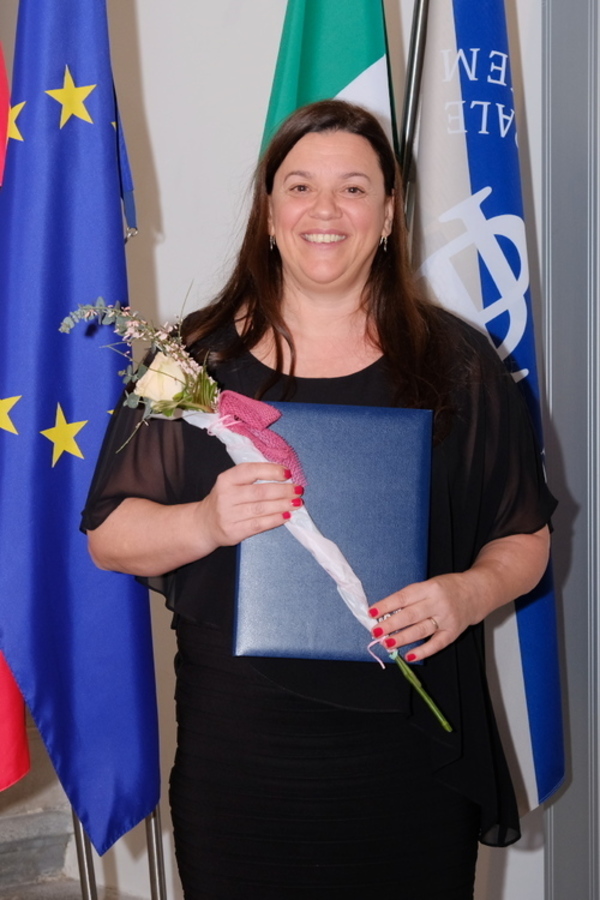
Dr Simona Kralj Fišer's research is in the fields of behavioural biology, evolutionary biology and ecology, and focuses on various interesting aspects related to animal behaviour and life history traits. Her work is particularly distinguished by her research on sex differences in behaviour and morphology, investigating the genetic and developmental mechanisms underlying these differences. Her research uses a combination of quantitative genetic and experimental approaches, including pedigree breeding, quantitative genetics, genomics and transcriptomics. She also studies mating strategies and systems and sexual size dimorphism, in particular the architecture of sex-specific traits and how maternal effects may influence phenotypic differences between the sexes. An important part of her research is devoted to the study of within-species differences in personality, examining how sexual selection influences personality traits, the genetic architecture of these traits and their sex differences. She collaborates with a wide range of researchers and institutions to publish her findings, making important contributions to our understanding of the evolutionary and ecological basis of animal behaviour.
Dr Simona Kralj Fišer has co-authored 52 original scientific articles, of which she is the first or lead author in 28, and two chapters in monographs, with a total of 852 net citations. Dr Simona Kralj Fišer is the leader of the programme group "Biodiversity: patterns, processes, predictions and conservation". She has led or participated in a number of research projects, working mainly with the Faculty of Biotechnics, the Faculty of Mathematics, Natural Sciences and Information Technologies (FAMNIT) and the National Institute of Biology.
Dr Simona Kralj Fišer's pedagogical work includes teaching at the University of Primorska and at the ZRC SAZU Graduate School. At the University of Primorska, she works at the Department of Psychology at UP FAMNIT, where she lectures in Behavioural Genetics. She has been a mentor or co-mentor for more than 16 graduates or master students and a mentor and co-mentor for two PhD students. She is or has been involved in PhD student supervision committees at the University of Singapore and at the University of Jyväskylä (Finland), and two of her students have been awarded prizes for the best thesis or PhD thesis for their work.
DR. MARKO OREL, FULL PROFESSOR IN THE FIELD OF »MATHEMATICS« AND RESEARCH COUNSELLOR
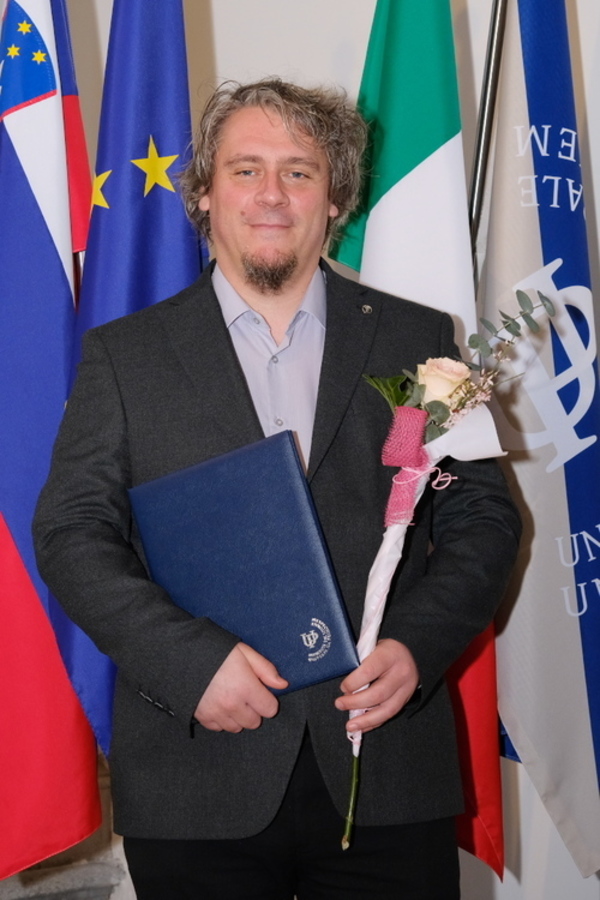
Initially, the research work of Marko Orel involved preserver problems in matrix theory. Already during his PhD study, he started to combine preserver problems with a graph theoretical area that include the study of graph homomorphisms and cores. The intersection of the two research fields involved several mathematical structures over a finite field. In a more recent research work, he built some new bridges that connect matrix theory and graph theory one side and finite geometry and coding theory on the other side.
The research publications of Marko Orel are spread into 13 different research journals and books. Among them we can find journals as Linear and Multilinear Algebra, Journal of Combinatorial Theory - Series A, and Finite Fields and their Applications. In particular, he is the sole author of 11 scientific articles and one book chapter that combine in total for 279 pages of original research work. He served as a referee for 11 different journals with impact factor.
Marko Orel has teaching experience at the University of Primorska, University of Ljubljana, University of Nova Gorica, and at the University of Rijeka. In total he had 28 different course lectures and tutorials at 9 different faculties. Since he joined the University of Primorska, he had several leading and administrative functions. In particular, he is a board member of University of Primorska since 2011 and the vice-dean for science and research at UP FAMNIT since 2012.
DR. ADEMIR HUJDUROVIĆ, FULL PROFESSOR IN THE FIELD OF »MATHEMATICS« AND RESEARCH COUNSELLOR
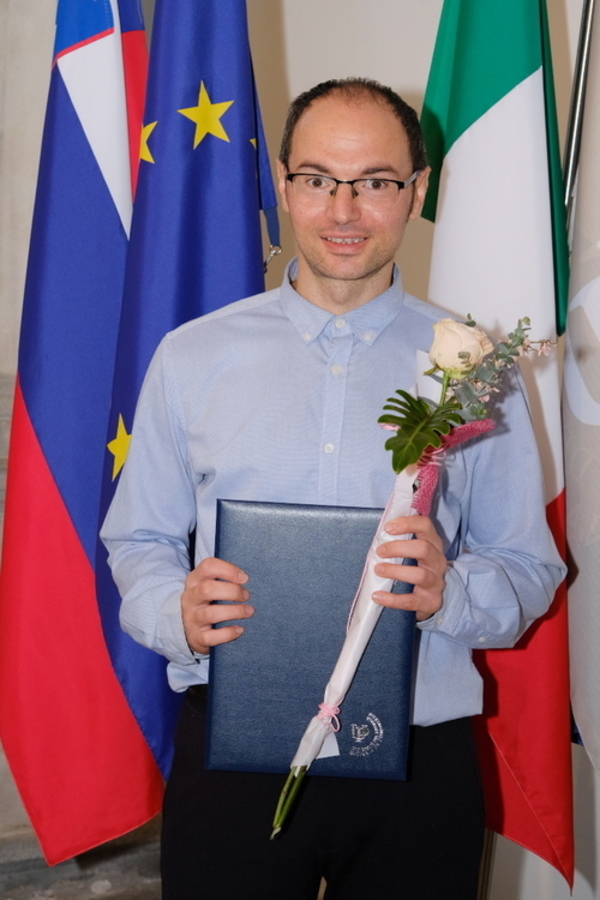
The research work of dr. Hujdurović is graph theory, primarily focusing on the study of the properties and characterization of graphs that possess a certain degree of symmetry. Some of the most important results of Dr. Hujdurović are the proof of the conjecture about the non-existence of non-trivially unstable circulants of odd order, as well as the solution of some open questions regarding the intersection density of transitive permutation groups.
Dr. Hujdurović has so far co-authored 34 original scientific articles in SCI-listed journals, with a total of 132 pure citations. As a researcher, he is a member of the program group Mathematical modelling and encryption: from theoretical concepts to real-life applications, within which he participated in numerous research projects in the field of mathematics. In 2019, he received the award for scientific excellence of the University of Primorska, and in 2023 the Kalman Visiting Fellow award of the University of Auckland, New Zealand. Since 2023 he is a managing editor of SCI journal Ars Mathematica Contemporanea.
The pedagogical work of dr. Hujdurović includes participation in the implementation of study programs of all levels in the field of mathematics and first-level study programs in the field of computer science and informatics at UP FAMNIT. He was a mentor or co-mentor for three doctoral dissertations and three master's theses in the field of mathematics. Dr. Hujdurović was a member of the organizing committee of a large number of international mathematical conferences and summer schools, including a member of the organizing committee of the 8th European Mathematical Congress. He was an invited lecturer at international conferences and universities in Turkey, Austria, Spain, Bosnia and Herzegovina, Serbia, USA, South Korea, Hungary, New Zealand and Croatia.
DR. RUSSELL STEPHEN WOODROOFE, FULL PROFESSOR IN THE FIELD OF »MATHEMATICS« AND RESEARCH COUNSELLOR
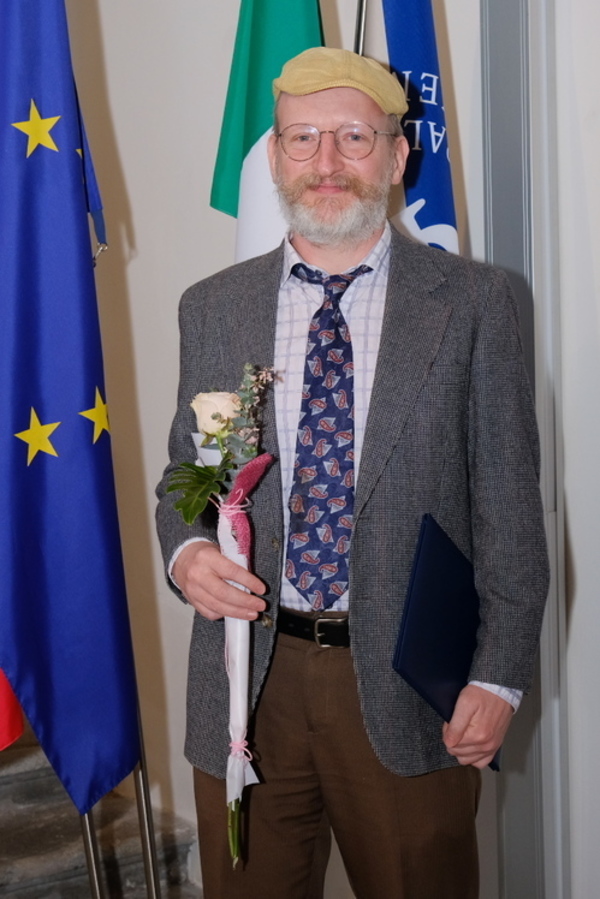
Dr. Woodroofe's first job after the PhD was at Cornell's medical college campus in Doha, Qatar, where he taught premedical calculus. In 2008, he began a postdoc with John Shareshian in the Department of Mathematics at Washington University in St. Louis. He moved in 2012 to Mississippi State University as a tenure-track assistant professor of Mathematics. While at Mississippi State, he spent a semester in 2016 visiting the University of Miami; and he visited the University of Primorska several times on guest researcher grants. Dr. Woodroofe came to the University of Primorska in the fall of 2017 as an associate professor, and has been here since.
The research work of Dr. Woodroofe is broadly centered around combinatorics, group theory, and topology. He is an expert in the technique of shellability. He has built tools to shell lattices of subgroups and cosets, and similar lattices. He is perhaps best known for his work in combinatorial commutative algebra, which demonstrated to researchers in that field how to make good use of techniques from topological combinatorics and graph theory. His recent work concerns application of Smith-Oliver theory to posets of groups or cosets, and application of techniques inspired from algebraic geometry to Erdős-Ko-Rado problems.
Dr. Woodroofe has published 22 mathematical articles, including an article in the Journal of the Association for Computing Machinery and two articles in Advances in Mathematics. He also has a significant package of mathematical software, with his Gap.app computer algebra frontend and distribution.
At FAMNIT, Dr. Woodroofe has taught courses for mathematics, computer science, and bioinformatics students, in topics around topology, analysis, and combinatorics. He advised the PhD thesis of Andrés Santamaría-Galvis. He also advised two masters theses of students at Mississippi State, and has advised formal and semi-formal undergraduate research projects for eight students. In 2011, he received the Guido L. Weiss Teaching and Service Award from the Department of Mathematics at Washington University in St. Louis.
DR. MIKLÓS KRÉSZ, FULL PROFESSOR IN THE FIELD OF »COMPUTER SCIENCE AND INFORMATICS« AND RESEARCH COUNSELLOR
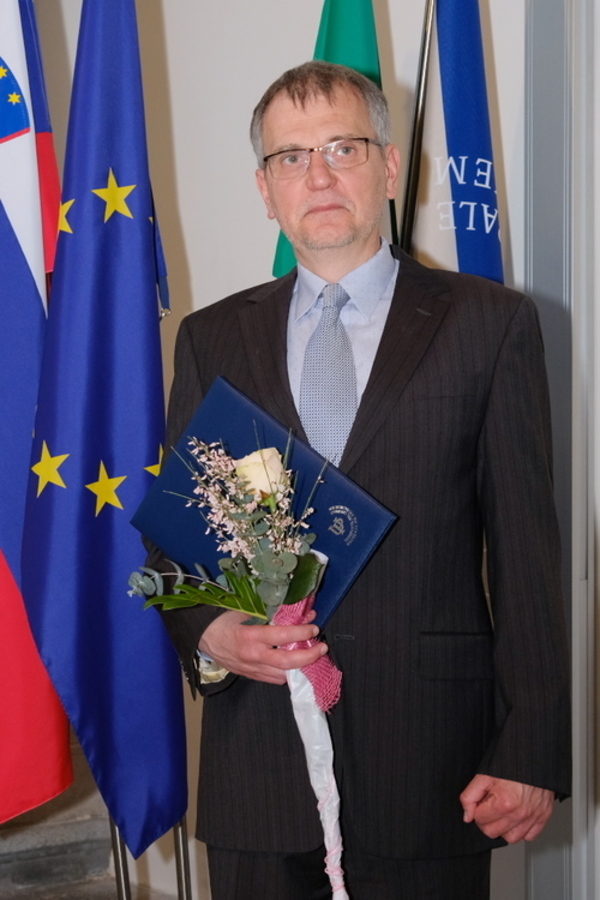
Continuing his academic journey, Miklós Krész pursued a Ph.D. in Mathematics and Computer Science at the University of Szeged, earning his degree in 2005. During this time, he joined the Department of Applied Informatics at the same university, where he has been a college professor since 2010. Between 2011 and 2018, he assumed the role of Department Head. Alongside his colleagues, he co-founded a research and development start-up whose main product was a network analysis software for risk assessment. This software found applications in leading banks, insurance companies, and telecommunication firms.
Since 2006, Miklós Krész has been actively involved in teaching at the University of Primorska. Initially, he served as an Erasmus teacher, and from 2009, he took on the role of lecturer in the Computer Science MSc program. In 2011 he was granted the title of assistant professor and since 2017, he has held the position of associate professor. In October 2017, Dr. Krész became part of the newly established interdisciplinary center, InnoRenew CoE, where he assumed the role of research group leader. Currently, he serves as the head of the Research Department Information Processing. Additionally, since March 2018, he has been a senior researcher at the Institute Andrej Marušič, University of Primorska.
Miklós Krész’s main research areas are industrially motivated discrete optimization methods, data driven industrial solutions and the integration of operations research and data science methodologies. Both fundamental and applied research in the above fields is in the focus of his interest. He has co-authored 75 original scientific articles, and four chapters in monographs, with a total of almost 300 pure citations. He was a leading expert in over 50 interdisciplinary and industrial projects. He was the Secretary General of the Hungarian Operations Research Society and currently he is the vice chair of SI MATH IN - Consortium for Industrial Mathematics (Slovenian network of EU-MATHS-IN: European Service Network of Mathematics for Industry and Innovation).
Dr. Miklós Krész has an extensive teaching background. At the University of Szeged, he covered a diverse range of subjects, including Formal Languages and Automata, Information Systems, Operations Research, Statistics, Artificial Intelligence, and Data Mining. At the University of Primorska he is actively involved in both the Computer Science and Data Science MSc programs. Specifically, he serves as the main lecturer for the courses Selected Topics in Theoretical Computer Science and Mining Massive Data. Additionally, he co-coordinates the Data Science Seminar course. Dr. Krész’s commitment extends to the Renewable Materials and Healthy Built Environment PhD program, where he participates in teaching various courses and the lecturer of the Design and Analysis of Experiments course. Furthermore, he also delivered specialized courses at the University of Turku, Finland, covering topics such as Algorithm Engineering, Optimization, and Data Mining. He has been a mentor or co-mentor of 15 MSc students and a supervisor or co-supervisor for four PhD theses.
dr. Lara Lusa, redna profesorica za področje »Statistika« in znanstvena svetnica
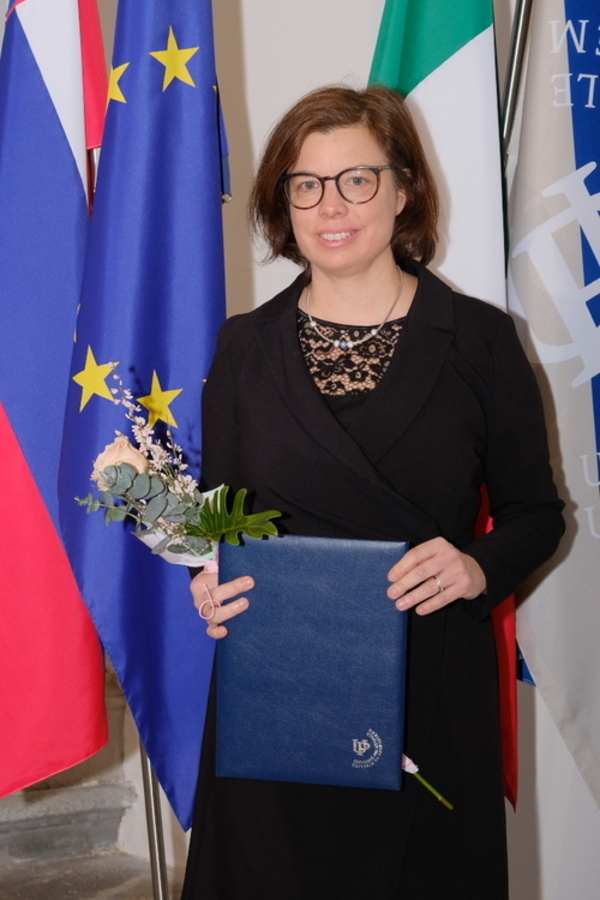
Raziskovalno delo dr. Luse zajema področje razvoja statistične metodologije za potrebe medicinske statistike. Najbolj odmevni so njeni članki s področja visokorazsežnih podatkov. Njeno trenutno raziskovalno delo se osredotoča na začetno analizo podatkov. Od leta 2016 je članica mednarodne pobude STRATOS (STRengthening Analytical Thinking for Observational Studies), ki vključuje strokovnjake številnih različnih področij biostatistike, kjer je sopredsednica delovne skupine o začetni analizi podatkov in članica delovne skupine o visokorazsežnih podatkih.
Bibliografija dr. Luse do sedaj obsega 85 izvirnih znanstvenih del v revijah s faktorjem vpliva, od tega je prva ali vodilna avtorica v 21 člankih, skupno število čistih citatov presega 2500 in njen indeks citiranosti h je 26. Ima tudi 14 člankov, ki so opredeljeni kot izjemni dosežek po metodologiji Javne agencije za znanstvenoraziskovalno in inovacijsko dejavnost Republike Slovenije. Za svoje raziskovalno delo je leta 2020 prejela Zoisovega priznanja za znanstvene dosežke pri razvoju metodologije medicinske statistike, leta 2021 je bila prejemnica nagrade za zanstveno odličnost Univerze na Primorskem. Svoje raziskovalno delo je predstavila z vabljenimi predavanji na mednarodnih konferencah in na univerzah v tujini.
Pedagoško delo zajema izvajanje predmetov s področja statistike in uporabne statistike na vseh nivojih različnih študijskih programih na Univerzi na Primorskem in na Univerzi v Ljubljani. V slovenskem prostoru aktivno sodeluje v dejavnostih Statističnega društva Slovenije, od leta 2013 je sourednica revije Metodološki zvezki – Advances in Statistics and Methodology, od leta 2016 pa predsednica programskega odbora mednarodne konference Applied Statistics.




